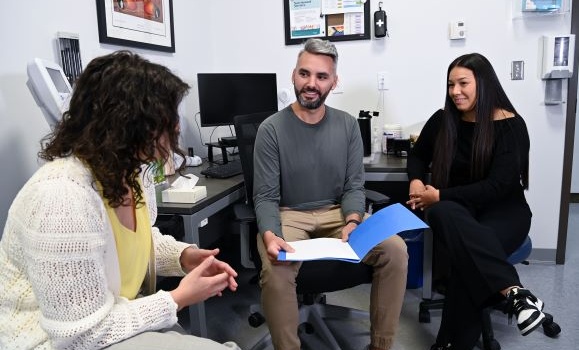This article is part of a series focusing on the grads of the Dalhousie Class of 2025. Spring Convocation takes place May 30 and from June 9-19 in Halifax and Truro. Read all our profilesĚýhere in one placeĚýas they are published.
Born in Kjipuktuk in Mi'kma'ki, Dr. Jordin Fletcher's journey is a testament to strength, resilience, and the power of representation.
Raised in Dartmouth and Porters Lake, she carries the rich heritage of the Missanabie Cree First Nation — her grandmother is a residential school survivor — and Millbrook First Nation, along with the influence of her white settler grandparents. By the time she entered high school, she knew she wanted to pursue a career in medicine, an idea nurtured by her mother’s support and encouragement.
Dr. Fletcher completed an undergraduate degree in nursing at Dalhousie and worked as a registered nurse for five years before applying to medical school. She recognized the racism, harm, and overall structural violence that Indigenous people face in healthcare. When she began her medical studies, she hadn’t encountered another Indigenous physician. This changed in 2021 when she met Dr. Brent Young, who is Anishinaabe and a member of Sandy Bay First Nation, as well as academic director of Indigenous Health at Dalhousie, and clinical lead at the Wije’winen and Sipekne’katik Health Centres.
“Meeting Dr. Young and knowing that we exist and that there's at least some safe space to work in was reassuring," she says.
Creating safe spaces
ĚýĚý
As she embarked on her medical school journey, Dr. Fletcher wanted to increase that safe space so she and two of her peers founded the Indigenous Medical Student Association (IMSA).
“Surviving medical school as Indigenous students requires strong community, so we created the IMSA so students could access resources to support building one,” she says. “We also knew it was important to have a collective Indigenous medical student voice.”
Under her direction and after numerous conversations with leadership, the Indigenous medical student lounge was created as a space for belonging. It became a symbol of support and celebration, reflecting Dr. Fletcher's commitment to her community.
Recognizing the dehumanizing foundations of medical education with respect to Indigenous peoples, Dr. Fletcher also pushed for culturally informed curricula and resources. Her efforts resulted in a permanent Indigenous medical student representative on the undergraduate medical education curriculum committee and contributed to culturally appropriate representation in medical cases in the undergraduate program.ĚýĚýĚý
Last month, she was recognized with the Association of Faculties of Medicine of Canada (AFMC) Indigenous Health Advocacy Learner Award. The award is a celebration of her outstanding dedication to dismantle anti-Indigenous racism and advance cultural safety, health equity, and the wellness of First Nations, MĂ©tis, and Inuit peoples through advocacy, education, and research. Though honoured to be recognized at a national level, Dr. Fletcher says receiving the award is bittersweet.
“I think the real question is: what do awards like this mean to residency programs—especially those where Indigenous physicians aren’t even getting through the doors? They can offer validation in a colonial language, but what matters most to me is the impact on community and my people.”
Breaking barriers and building community
Ěý
In 2024, Dr. Fletcher completed a family medicine elective at the Wije’winen Health Centre and Sipekne’katik Health Centre with Dr. Young and, then resident, Dr. Shanté Blackmore from Millbrook First Nation. It was the first time an Indigenous medical student, resident, and staff physician practiced together. The experience was a medical school highlight for Dr. Fletcher and had a significant influence on her future residency.
“I always wanted to work in community, and seeing the scope of what can be provided from a family physician perspective, I started to realize it was something that could work for me,” she recalls. “I was unlikely to consider family medicine without this rotation.”

Jordin Fletcher (left) works alongside Dr. Brent Young (centre) and then medicine resident, Dr. Shanté Blackmore at the Wije’winen Health Centre. (Danny Abriel photo)
Dr. Fletcher will begin her family medicine residency here at Dalhousie alongside Dr. Young at the Sipekne’katik Health Centre in July, and she is looking forward to providing the same leadership and visibility for future medical students that she experienced.
She recognizes the importance of having Indigenous clinicians working with and in community, in research, and in medical education and is deeply committed to fulfilling this vision. "This is what reconciliation looks like," she says.
“It's a really special space to be welcomed into, and you have to treat it as an honour,” she says. “There's a lot to learn and a lot of listening.”
Guided by the values and priorities of the communities she serves, Dr. Fletcher’s future practice will embrace land-based approaches and relational ways of knowing. With humility and purpose, she is building a path where care is not only delivered, but truly shared.

